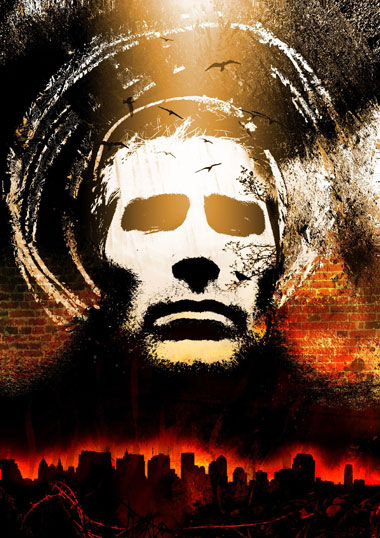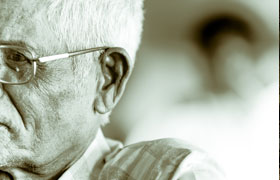Doubt is the motor of the modern mentality, the indefatigable engine that drives the spirit of our age. Such doubt was honored with an early recognition in the essays of the Renaissance courtier Michel de Montaigne: “We are, I know not how, double within ourselves, with the result that we do not believe what we believe, and we cannot rid ourselves of what we condemn.”
During Montaigne’s time, religious wars of unbearable cruelty flood Europe. The absolute certainty of the raging antagonists began to taint conviction itself with bad odor. But Montaigne saw deeper. He describes two sides within the very certitude of the religious partisans. He recognized their zeal as a kind of cover up, overcompensation for a hidden, an unacknowledged, lack of faith: “We do not believe what we believe.”
In modern times, disbelief has so far entered into the essence of our existence, that both faithlessness and faith have become fundamentally two varieties of faithlessness.
It is the secret disbelief of true believers that energizes the armies of the night in Mathew Arnold’s poem of 1867:
The Sea of Faith
Was once, too, at the full, and round earth’s shore
Lay like the folds of a bright girdle furled.
But now I only hear
Its melancholy, long, withdrawing roar,
. . . . . . . . . . . . . . . . . . . . . . . . . . . . . .
And we are here as on a darkling plain
Swept with confused alarms of struggle and flight,
Where ignorant armies clash by night.
William Butler Yeats delivers the ominous news in his prophetic, apocalyptic 1919 poem “The Second Coming”:
Things fall apart; the centre cannot hold;
Mere anarchy is loosed upon the world,
The blood-dimmed tide is loosed, and everywhere
The ceremony of innocence is drowned;
The best lack all conviction, while the worst
Are full of passionate intensity.
Others, of course, celebrated unbelief—it bestows liberation—and proselytized it. Leave it to Friedrich Nietzsche to push it as a jagged little pill: “Convictions are more dangerous enemies of truth than lies.” (Aphorism 483, Human, All Too Human: 1878 )
So it happened that, as a child of the times, and all too human, I swallowed the pill. I served at the altar of doubt. Unbelief became my credo.
It took half a dozen years in academia for me to recognize that disbelief—skepticism, relativism, nihilism—had itself become dogma. Departments of religion were pledging themselves en masse to the hermeneutics of suspicion. To confess any conviction other than mistrust of all convictions was to court anathema.
All joined in choir to hymn unwavering faith in faithlessness. This dogmatism began to rankle me. Something was wrong. I brooded, irritably.
And then, my breakthrough: We doubters were failing at doubt. We had failed to take our doubt far enough. If we are going to be thoroughly skeptical, then we must be also skeptical about our own skepticism. If all things are relative, then so must be our relativism itself.
I stated my case at an informal religion department gathering.
“You must feel like you’re walking a tightrope over an abyss,” responded a fellow grad student, only recently a nun.
“Yeah, but I’m not sure there’s a rope either,” I said. Everyone laughed.
Let us be bold enough to remove the very ground we stand on and miraculously levitate on nothing.
And so we come full circle. Doubting our own doubting, we find a surprise awaiting us: a tiny crack opens for the possibility of faith.
Just the possibility. Even less—just the openness to the possibility.
This becomes the crack that even God can squeeze through.
One thing led to another. Several years after the manifestation of the crack, I joined—to my permanent amazement—a high-demand “organized religion.” A religion committed to preaching. Labeled by one academic as “evangelical Hinduism.” (For a systematically misleading expression, this is spot on.)
Then came a time, fifteen or twenty years later, that I realized that I was utterly and completely certain that, as they say, “God exists.” I did not merely hold that a feasible case for divine existence could be made. Not at all. I was absolutely, totally certain.
This upset me.
I’m still a modern person. I assailed my own conviction: How could I be so sure? What right did I have to be so certain? How was it possible? How was I entitled to such a degree of certitude? What was wrong with me?
I attacked my own faith, and it repelled my assaults. I couldn’t shake it. It was as if it were simply there of its own accord, an irrevocable fact; it really didn’t depend upon me.
I put the matter before some judicious devotees. “It’s Krsna’s causeless mercy,” said one. “It’s a gift,” said another. A Ph.D. who once taught Christian theology to divinity students, she cited the distinction between certainty and certitude.
These conversations relieved me of my anxiety and allowed me to accept the gift wholeheartedly.
And yet—not to look the gift horse in the mouth—I found myself still impelled to understand better what I had been given.
I began my inquiry with this question: Is there anything at all that every person can be absolutely certain of? The question, of course, summoned me back to the origins of modernity, to the very “father of modern philosophy,” Rene Descartes, who turned Montaigne’s doubt into a methodology. Sweeping away, in his Discourse on Method, everything dubitable, he was left with only his own indubitable existence as a cognizant being. He could doubt everything except that he was doubting. Cogito, ergo sum, he famously wrote: “I think, therefore I am.” Descartes explained that by “thought” he meant “what happens in me such that I am immediately conscious of it, insofar as I am conscious of it.” His own existence as a conscious subject was absolutely certain.
Here I got my own clue and cue: Start, like Descartes, with myself.
But in this, it seemed to me, I was able to be more clear that Descartes. To “start with myself” means, to be precise, to start with ātman, the conscious self.
We commonly use the English “soul” or “spirit soul” to denote the same entity, but without the same clear meaning. The Sanskrit word ātman (in the root form) or ātmā (in the nominative singular), is a noun meaning “the self.” (The same word also serves as the reflexive pronoun, the “-self” in words denoting myself, yourself, herself, etc.)
When I take note, as Descartes did, of my own consciousness, I understand that I am aware, at least to some degree, of the ātman, of myself as a conscious, experiencing living being, now bearing and animating a certain material body and mind.
For two decades preceding my own Cartesian investigation, I’d been engaged in spiritual practices amounting to researching of ātman. To try to understand my own certitude about God, I began to reflect upon those practices.
Ātma-tattva, the science of the self, like any science, presents itself first as a theory, as kind of picture, or conceptual map, of spiritual reality. A theory, like a map, is the fruit of the experience of previous researchers, prepared as a guide for later explorers. The only purpose of theory is to guide practice, just as a road map is drawn up to facilitate a successful automobile journey.
Ātma-tattva also includes practical instructions on how to undertake the spiritual journey, how to use the map correctly. It is, in this way, an applied science dedicated to the clarification and expansion of consciousness.
We do not find any enterprise like this in modern Western philosophy. Modern philosophy certainly speculates endlessly about consciousness and experience, about knowledge and the knower and the known, but it has lost the applied element so prominent in the ancient classical traditions of Pythagoras, Parmenides, and Plato. There is now no distinctive “philosophical way of life.” It’s just another job.
I had taken up a tradition from India, yet it returned me to the very foundations of Western philosophy. When I recognized this, I felt that I’d come back home.
The applied knowledge, the spiritual way of life, requires a commitment to a relatively rigorous and demanding discipline. This is called yoga. The discipline is required to remove the material veil so that one can attain direct experience of spiritual reality: of the ātmā, the self, and of paramātmā, the superself or God.
The necessity for such a disciplined life is stated succinctly in Bhagavad-gītā (14.17): spiritual knowledge depends on goodness, on sattva. If our awareness is covered by the material modes of passion (raja-guna) and ignorance (tamo-guna) we will not be capable of direct perception of ātmā andparamātmā. Therefore, we who undertake this project live a regulated and radically simple life designed to minimize the demands of the senses, to decrease lust, anger, greed, and so on.
Modern materialistic culture fosters values and activities that expand the modes of passion and of ignorance, so it is necessary to insulate oneself from its influence. Spiritual culture has the contrary aim of developing goodness and reducing passion and ignorance.
After several decades of practice in ātma-tattva, the science of the self, my own consciousness had become somewhat clarified and expanded. I had gained at least some awareness of my own spiritual identity, and, along with that, of God.
A master of yoga named Kavi has stated (Śrīmad Bhāgavatam 11.2.42) that for one practicing properly, three things develop simultaneously: devotion, direct perception of God, and detachment from everything else. This happens in the same natural way that for a person who is eating, satisfaction, nourishment, and relief from hunger increase together with every bite.
In the yoga discipline, the practitioner realizes his or her own identity as ātmā and also encounters God initially as paramātmā, as the interior, guiding superself, the self of all selves. In this experience we find the Cartesian key. For knowing God, the paramātmā, is something like knowing our own self. Thus the experience engendered total certitude in the one experiencing it. As one cannot doubt one’s own consciousness, when that same consciousness has expanded somewhat, God becomes known as we know ourselves, for God is the very self of our self. At this time, we can no longer doubt God’s existence anymore than we can our own.
I could, of course, doubt my experience of objects perceived in this world. It is possible, Descartes noted, that one is being deceived by some evil demon. (Here he anticipated the premise of The Matrix by some four centuries.) Even so, one still cannot be deceived about one’s own consciousness.
Knowledge of God is not like knowledge of the external world. Of this table where I write, of the garden outside my window, of the people relaxing there. In every case, I am spirit knowing matter. But when you can realize your true position, there becomes a far more intimate connection between yourself and God. Not only are ātmā and paramātmā of the same spiritual nature, but ātmā is part and parcel of paramātmā. For this reason, once there is experience of paramātmā, doubting God becomes impossible. After that expansion of consciousness, God remains part of the content of every experience we have. We experience our own being as part of God’s being.
It is not that in this experience, we perceiving something novel, like a new next-door neighbor or the latest cool thing from Apple. Rather, with consciousness purified and expanded, we now perceive what had always be there, merely unnoticed, unrecognized, unacknowledged.
In this state of expanded consciousness, we become aware that we cannot see anything without God’s seeing it first, hear anything without God’s first hearing it, and so on. We lose all doubt of God’s seeing and hearing more than our own.
The experience of ātmā-paramātmā, which renders doubting God’s existence as impossible. As doubting one’s own is evidently not exclusive to our own or historically related traditions. A natural and unwavering certitude concerning God has appeared in advanced practitioners in many theistic traditions. Those traditions may have various theories (theological doctrines) about God and the worshipper, but, so far as I can see, the simplest and soundest explanation for the experienced certitude of advanced practitioners everywhere is found in the understanding of ātmā-paramātmā.
We can also conclude that we are made for belief, for conviction. There is no way around it.
Herein lies the foundation, I propose, for authentic conviction, for conviction arising from the opening up of the self. Without that, we seem condemned to verify Montaigne’s observation: “We are, I know not how, double within ourselves.” Authentic conviction may serve as an antidote to the current global wars between modes of duality: Militant belief born from despair and its own disbelief is clashing with militant unbelief born in denial of its own belief.







